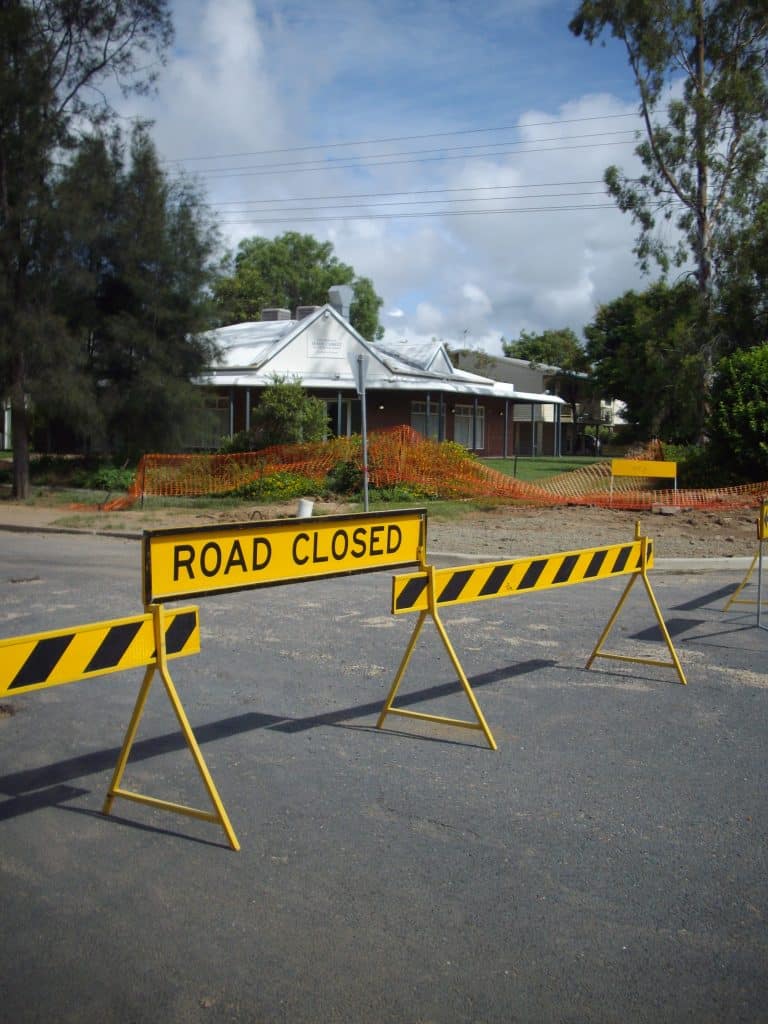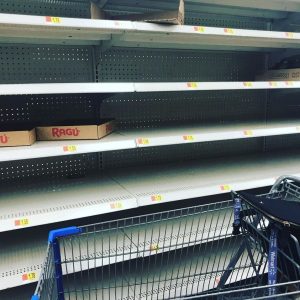
by Spunky
I attend the Emerald Branch in Central Queensland, Australia. If you have been watching the international news, you would have seen that Emerald is 80% submerged in flood water and is considered a disaster area. The entire flooded region is equivalent to France and Germany combined. All of the emergency evacuation centres are overfilled; some are under water. The first Grocery store, Coles, went under water earlier this week. Following that, police went in to the other two grocery stores and cleared the shelves of bottled water. The purpose was that they could better distribute it in case of a rationing emergency. The largest of the three grocery stores was nearly bare of product within a day of that, with pallets of stock pulled into the aisles for people to access quickly. Now this store is sitting in two feet or more of water.
The branch building was in a background shot on the news—oddly, between the muddy rivers that had once been roads, and between the houses that people were wading away from in knee-deep water, I could see green grass at the front of the chapel…suggesting that for some odd reason, it may have been spared of flooding. For now.
The flood is moving east to Rockhampton which is the main supply road to Emerald. Not that that matters—the roads have been intermittently blocked for the better part of the month of December, so supply deliveries were already somewhat sporadic. Now that the roads are securely blocked, there is a real threat of running out of food. The Prime Minister has declared about 20 natural disaster areas.
We have food storage. We are fine. We are dry and still have power. Others in the branch are not so lucky.
But I am annoyed by food storage. Don’t get me wrong, we are taught the principle of food storage in Australia. But every time I have been handed one of the “itemised food supply” lists in Relief Society, I throw it away immediately. Sure I feel guilty about it. Because it is wasting paper and killing trees to throw it away. However, the items on the suggested list are always inadvertently from American food supply companies or American-based LDS provident living groups. The lists aren’t bad, but… the last one advised collecting 10 pounds of butterscotch baking chips. We don’t get those here, and for chocolate chips, the package sizes are different, so recipes like “1 bag of chocolate chips, 1 can of condensed milk” are useless. A while ago, a visiting American sister recommended bottling our own produce. Nice suggestion… for North America. As a very removed and (normally) extremely dry continent, produce is expensive… the lowest price I have recently seen for fresh tomatoes- which are at the peak of the season, is about $1.50/lb. Add the cost of the average storage bottle and lid ($4 – $8 per bottle), you are looking at a jar of tomatoes that can cost up to $10 per bottle (compared to a tin of tomatoes which you can get on sale for about $1 per tin). Not real thrifty.
Some church members are keen on and adept in food storage here. But many church members don’t bother trying to do food storage, because there is no real guide and it becomes unaffordable to import the products, cooking tools and suggestions they feel obligated to because of the American food storage lists. You might think this is just an Australian problem, but I have family in Europe—they have been advised to not collect food storage because the housing space is limited and food can be so expensive that it is too difficult to make food storage into policy. So they are told to not bother, and skip “provident living” activities.
So does this mean food storage is really just a North American thing? This week in Queensland would prove differently. Those of us who have food storage are safe to stay, or can be comfortably relocated to a dry spot till we can return home. But I am anxious to help the branch members who have been displaced. I am sad for those who invested their limited food storage on freezer items—all which are inevitably defrosted and rotting in flood water. I felt a little dirty when I heard of a family searching empty grocery aisles for milk for their children, because I had a stock of powdered milk at home.
Now, in my next life, when I become an independent billionaire, I hope to travel to each country of the world, experience the culture and create an informed food storage list based on the local economy, food supplies and culture. No joke. I have thought about this long before this flood because I was so annoyed with the standard suggestion lists. In the meantime, am I asking too much for people to send food storage suggestions? Especially those who have served missions and are award of dietary differences, or been in situations where they have lived off of their food storage? American suggestions are welcome as well– don’t hold back! But please omit recipes with brand-name cake mixes, butterscotch chips, etc.
For me… I have noticed the absence of eggs. My bread recipe calls for eggs, so I wished I had a powdered version of eggs, though I haven’t really needed them. (and some people here have chickens, but the weather has them spooked so they aren’t laying). I would also add more pop-top tinned food- i.e. the kind you can open and eat without cooking if necessary, and insect repellent. I also always have alcohol. If it is too wet to start a fire, and the power is out, alcohol works just as well as lighter fluid, and people gift it to us for free at Christmas. I have a great recipe for damper- an Australian quick-rise bread that can be cooked on an open fire, in case the power is out. So….Please share your suggestions… and help make food storage an “international church” reality.
Jan 4 update: Church members and others who had the majority of food storage in the freezer lost all of their food storage as a result of the loss of power. All of the grocery stores in Emerald had water, one was almost completely submerged. As a result, and because the roads are still closed, there were helicopter drops of food in the isolated areas, so people have been provided for. This week, one of the stores has re-opened, but bread, milk and cash is being rationed. The threat now is that the flooded area was a farming area, meaning that in the next year, they anticipate the cost of squash, pumpkin and other destroyed crops to at least triple. It is an amazing testimony of food storage…even if it is sans butterscotch chips






18 Responses
Spunky, so sorry you are experiencing this, and glad you were prepared.
When we were in Korea 25 years ago it was illegal to have food storage (hoarding). In Japan 5 years ago it was illegal not to have a 72 hour kit (earth-quake preparedness).
As for food storage suggestions, we all have to adapt them to suit our needs and circumstances.
Thanks, Marta. I had heard the same for Indonesia… that collecting food is illegal. Is is illegal to stock cleaning supplies like disinfectant? Not to sound silly, but sanitary conditions in natural and other disasters quickly decline… so next to the shelves being bare of bread a milk, they are also void of disinfectant, etc.
Thanks for the thoughts. I definitely think there are different ways to do food storage. Even here in North America. I try to keep on had lots of canned items that we enjoy eating, even though they are not on the “list”. I also have bottled water and two 50 gallon barrels of water. I hope you are able to get lots of good suggestions and can share them. Thanks again! And I hope things continue to dry out and get better for you and your area.
also, i wish there were a way to save all that water for the next dry season.
Spunky, what an important post! I never thought about how US-specific food storage lists and recipes are in Mormondom.
This probably doesn’t help because the company is based in Seattle, Washington, but for eggs, I use this egg replacer in baking (because my son is allergic to eggs). It doesn’t make an omelet, but it will make baked goods rise.
I had hear about the flood, but I had no idea of the scope! Keeping you and Emerald in my prayers.
I think you are focusing on the people in the Church distributing the “Americanized lists” vs what counsel actually is- 3 months of what you regularly eat, water, financial reserves and 9 months of long-term storage. So buy what you eat and is on sale! The counsel has also been to follow the law of the land.
There is no counsel to have a 72 hour kit as a previous comment mentioned a lot of people do it, but it is not from SLC.
This is definitely a situation where I would advocate only using offical Church sources for lessons (providentliving.lds.org) and not going to outside blogs or other resources. The Church is aware of differences between countries and their counsel does try, as much as possible, to take into account global differences. This can be frustrating, however, because a lot of their counsel does seem to sound like ‘adapt to local situations as necessary’ instead of giving specifics. However, I do feel like their basic counsel is sound. You should have a 3-month supply of food that is readily available and that you regularly eat, and rotate that into your every day eating. If you don’t eat butterscotch chips, then for heaven’s sakes, don’t worry about them. If it is cheaper to buy pre-canned tomatoes, do that–there is no worthiness question about canning your own produce.
I still remember Chieko Okazaki’s talk where she had a bottle of peaches and a basket of mangoes and discussed how they are both valid ways to practice provident living. We have many family members who live in Hawaii and they do not can their own produce, but they do have the advantage of being able to garden year-round. Food is also expensive there, so they stock up when things are on sale and focus on basic foods like dry beans, whole grains, and so on. I served my mission in Spain and most people live in small apartments, but I know several members that tried to have some food on hand. They usually stored things like rice and other grains, beans, pasta, hard sauasage, canned fish, and so on.
I live in Utah but I mostly ignore ‘food storage companies’ and their suggestions. My family doesn’t eat much meat, so I mostly have dry and canned beans in my pantry. I’ve seen some lists with things like ’24 cans of chili and 24 cans of beef stew’ and those just gross me out. We keep dried grains, canned vegetables and fruits, pasta, some pasta sauce, baking items (flour, sugar, canned milk, baking soda, yeast). I don’t like to cook using processed foods so I don’t keep things like cake mix or canned soups on hand.
When teaching lessons about provident living and food storage I think it is best to teach the principles and then encourage members to make their own lists based on their needs and what is available in their area. It is also vitally important to be aware of what possible disasters in your area are. I don’t live in a flood-prone area, but there is a chance of earthquake. I know I need to have canned food in a safe area that will be easy to use in the case of a disaster like that (like pop-top cans and non-refrigeration items). ALl my jars of fruit in the basement will be smashed to bits in an earthquake; but for now they are feeding my family in the winter when fresh produce is not so readily available. I am pretty good at the long-term storage and the shorter term stuff for saving money, but this post was a good reminder that I need to do more planning for possible disasters like earthquakes.
Thank you for bringing your situation to everyone’s attention. I hope your community is able to recover quickly.
I’m sorry you’re going through that. I live in a coastal area, and we are prone to hurricanes. The last hurricane that hit had people without power for 2 weeks and grocery stores completely cleaned out (and rationing) for about the first week. It really opened my eyes to how vulnerable we really are — with 100 lbs of wheat sitting in the corner, but all our freezer food rotting…
My thoughts around food storage have changed to be two separate “stores” for two very distinct needs (1) what do we need to get through a natural disaster (days to weeks, not months or years) …. stuff like bottled water and batteries – the first things cleaned out of the grocery stores whenever a hurricane is in the gulf! these are often things that are impractical to have a “years worth” (2) what do we need to get us through an economic crisis (months to years) knowing we can supplement with fresh and that we’ll actually eat (ditto FoxyJ on this one – please no canned meat stew!!)
Best to you….. the cleanup is a lot of work…
Its interesting that people have mentioned dislike of canned stew. I am the same- yuck! There are some things I am not sure I could eat if I were starving… but that sort of creates a problem.
A number of people here, if not the majority- prefer “eating fresh”- and who doesn’t? What I have missed most in the last few weeks has been fresh produce. A sister I used to VT adamantly stated that she only gave her children fresh food– that was who she was and she wanted us to know it! If she had pasta and sauce, the sauce was from fresh tomatoes, no cans or bottles in her pantry! Jam on a sandwich? She made it fresh that day! So, as I was new to the area, I asked about food storage, and she became angry and shrugged me off as though I were an idiot who did not understand. More that a few people are like that here, and while I understand the desire for freshly prepared food, I see this as being potentially really big problem.
This is a farming area- and basically, all of the crops are destroyed. The fields that have not yet flooded are isolated because rails and roads are flooded and closed, so the produce is rotting in the fields because it can’t get to domestic or international markets (which is going to cause economic and supply problems for the rest of the country as well). So- if you live in a farming area, and rely upon fresh produce- or you have a garden and rely upon that, there could be an issue with the supply when there is a disaster. This might not only be for the few weeks (fingers crossed) of the crisis, but for the season, which means a year. This suggests that to a degree, our “fresh only” eating habits could be detrimental in a crisis. This has been something on my mind as I see mango trees submerged in cloudy flood water and as I think of the woman who refused food storage because it wasn’t good enough.
In addition, with the loss of power, there has been a lot of rotting meat. Rotting meat attracts flies, maggots, etc. And since the roads are closed, there has been no garbage pick up. Insect spray has become one of the most-desired items as a result– because it feels filthy to prepare food (canned or fresh) and eat in a fly-infested space. (there is also a threat of Mosquito-borne illnesses as well). So I think insect spray or a fly/mosquito cloth is equally as important as disinfectant in a food storage prep kit. So back to the canned stew- yeah, not my cup of tea, but in avoiding flies, I think it would be more sanitary to eat out of a can (stew or otherwise) under a blanket, if needed. Sorry to be gross. Its been a gross week.
Brilliant idea, BTW about “2 stores” of food… makes a lot of sense.
This is such a timely post, Spunky! I’m not sure what to tell you about food storage; I’m sort of figuring it out as I go along, too. A few years ago I got a year’s supply of food storage all at once. (I know, that’s not how we’re supposed to do it, but I did.) Now I have no idea what to do with all these cans of wheat and such. My new year’s resolution is to figure it out, and I’m blogging it. So, while I can’t answer your question now, I might figure it out by the end of the year!
(Sorry for the blatant promotion of my blog. I’m not a hit-and run commenter. I’m actually a semi-regular commenter under a pseudonym, but since my food storage blog is under my real name, I’m using that for my comment this time.)
We did the same thing a few years ago. Regret. We don’t eat any of it! I’m hoping it’s good for bartering with in a disaster, because I’m woefully lacking in other areas of necessity.
Great post Spunky, and something we really need to focus on in new ways I think.
I’m staking it all on bartering. That’s why we stock up on Coke and Charmin toilet paper.
Thanks for this fascinating insight into LDS life outside the U.S., Spunky. I do hope you and your neighbors recover quickly from this crisis.
I admire your desire to take the food storage injunction seriously. I’ve never paid much attention to it. I know my unorganized self, and I’m quite sure that if I bought cans of wheat it would just rot in my garage. I’m better off with cases of granola bars and maybe some extra pasta and pasta sauce. (Though I haven’t stocked up on those either.) I was pretty proud of myself a few months ago when I bought two two gallon jugs of water to keep in my garage. Anyway, your post reminds me that I should do better. Thanks again!
For egg substitutes, I discovered an entire list of them on a website called vegweb.com. My favourite is:
1 egg = 1 tablespoon ground flax seed + 3 tablespoons hot water (let stand 10 minutes; use: binding and moisture)
This really works — I’ve tried it, and it’s great. Other egg substitutes for baking include substituting one quarter cup of applesauce, mashed banana, or even cooked mashed pumpkin or squash for each egg. I’ve done the applesauce and banana thing for cookies, and again, they turned out wonderfully. Here’s a substitute that I personally haven’t tried, however, but if you need it for leavening, then here it is.
1 egg = 1-1/2 tablespoons baking powder + 1 tablespoon warm water + 1 tablespoon apple cider vinegar
I live in Europe, by the way, and try to store foods we usually eat, including flour, sugar, salt, oil, rice, spaghetti noodles, dry packets of spaghetti sauce where you only need to add water, and that sort of thing. I do have a few MRE’s on hand for real emergencies (I got them through eBay) and some jugs of water. I don’t have anywhere near a year’s supply of anything, though — probably only two or three weeks worth at best. Still, it’s a start.
Thanks, Melanie- I am going to give that a go! As for those who have unused wheat… I don’t store wheat. I don’t generally like wheat, and usually only use half what is called for in recipes, while substituting ground organic oats or similar in quick breads (I have had Organic Oats for 3 years and they are still good). The wheat I do keep– well, is flour (white does last longer than wheat or whole meal- put it in the freeezer for 3 days after purchase or store it in the freezer and it keeps very well). Or I keep bulgher wheat, which frankly I love because of tebulleh. So I do make use of that, even if the tebulleh is made with sun-dried, rather than fresh tomatoes. I also store some organic coconut flour (great in quick breads and muffins), but I find it is best kept in the freezer for as much as possible because it has a shorter life span.
[…] and associated posts offered me a safe place to just be me. I soon became a regular reader. Then guest poster, then perma […]